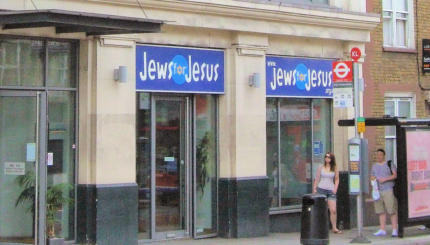Meet Jim Long. A documentary filmmaker with striking blue eyes, Long recites blessings in Hebrew before eating, peppers his conversation with Hebrew phrases–a "b’ezrat Hashem" (with God’s help) here, a "baruch Hashem" (praise God) there–and keeps a household that is, to the untrained eye, traditionally Orthodox. Only Long is not actually Jewish, nor does he have any plans to convert.
Instead, Long and his wife Carol are part of a small but growing movement known as the Noahides, or B’nei Noah–the Children of Noah. It’s a life based on, or starting from, the so-called Sheva Mitzvot B’nei Noah, the Seven Commandments for the Children of Noah. Derived from the Book of Genesis and elucidated in the and other traditional texts, the laws are, according to Jewish tradition, incumbent on all humanity. Though sometimes phrased and ordered differently, the Sheva Mitzvot B’nei Noah are: (1) Do not worship false gods; (2) Do not murder; (3) Do not steal; (4) Do not be sexually immoral; (5) Do not eat a limb removed from a live animal; (6) Do not blaspheme; (7) Set up a court system.
To Noahides, these seven laws are but a starting point, the foundation on which they’ve built a lifestyle of obligations and voluntary observances. The result is a life every bit as rigorous and all-encompassing as Orthodox Judaism, which guides and structures all aspects of their existence. While others drawn so intensely to Judaism would likely convert, these non-Jews have chosen to remain outside the fold, believing that life as a Noahide is an end in itself, a way to be partners–if not quite equals to the Chosen People–in the divine plan for the world.
Unbeknownst to most Jews, there are hundreds, maybe even thousands, of Noahides, and most, like the Longs, are former Christians who’ve turned their backs on the faith. This is not the first time the world has seen a community of "Righteous Gentiles" who center their beliefs around Judaism, but Long and his fellow Noahides represent the first modern attempt to take that 2000-year-old body of theoretic writings and bring it to life as a worldwide movement. And for that, they can largely thank the vision of one 20th-century Jewish thinker: Rabbi Menachem Mendel Schneerson, the late Lubavitcher rebbe.

Help us keep Jewish knowledge accessible to millions of people around the world.
Your donation to My Jewish Learning fuels endless journeys of Jewish discovery. With your help, My Jewish Learning can continue to provide nonstop opportunities for learning, connection and growth.
The Chabad Factor
Schneerson’s teachings about the messiah (mashiach or moshiach) are well known: He believed that taking steps to hasten the arrival of the messiah is every Jew’s most significant duty. And to the Rebbe, bringing the messiah meant not just living a life of Jewish observance, but also bringing all Jews to tradition as well.
Spreading the Noahide laws to non-Jews was part and parcel of that same dream. The messiah would come when Jew and non-Jew alike do God’s will; for the latter group, that means following the Noahide laws. Though these ideas were long a part of Schneerson’s teachings, it was only toward the end of his life that he began urging his followers to go out and actively spread Noahide beliefs to non-Jews as an antidote to society’s moral degeneracy.
The contemporary Noahide movement began to take shape during Schneerson’s lifetime, but its major growth has taken place in the years since his death. This has been fueled largely by the Internet, a powerful tool for a movement comprised mostly of single individuals and families practicing alone or in very small groups around the globe.
Jewish Views on Non-Jews
Though the Jewish vision for the idealized, messianic future does not call for a world full of Jewish converts, Jewish law has plenty to say about what it expects of non-Jews, namely a righteous life guided by the Seven Mitzvot B’nei Noah. In classic Talmudic fashion, once the rabbis examined, explored, extrapolated, and otherwise developed the Sheva Mitzvot, the "seven" laws were much more than just seven. Applying the single commandment against sexual immorality, for example, the rabbis found it to include numerous particular prohibitions against incest, adultery, and other specific practices.
But are these rules a Jewish version of natural law–a set of universal moral imperatives that people are assumed to intuit on their own–or are they something that Jews must actively go out and bring to the world?
According to the great medieval Jewish philosopher and legal authority Moses Maimonides, teaching non-Jews to follow the Noahide laws is incumbent on all Jews, a commandment in and of itself. However, most rabbinic authorities rejected Maimonides’ view, and the dominant halakhic (Jewish law) attitude had been that Jews are not required to spread Noahide teachings to non-Jews.
And that’s where things stood in Jewish law for centuries–until an aging rebbe turned that on its head. "Every Jew has the obligation to ensure that all the peoples of the world observe the Seven Noahide Laws," Rabbi Schneerson said, according to Noahide.org. "An integral component of the Jew’s task is to see to it that all peoples, not just Jews, acknowledge God as creator and ruler of the world."
It is a view that remains controversial. "If Jews are telling Gentiles what to do, it’s a form of imperialism," says David Novak, a University of Toronto theologian. To him, the Seven Mitzvot are a set of rules that Judaism prescribes for non-Jews while assuming any civil society or moral individual will reach these conclusions on their own, without prodding. The Noahide laws, in his eyes, are valuable as a moral foundation that allows Jews to get involved and speak out on issues of public morality, a universal ethical code with which to engage larger societal issues–and are not a religion around which non-Jews are expected to structure their daily lives.
Creating a Lifestyle
Despite the passion of committed Noahides, embracing seven laws of basic morality does not a lifestyle make. In some key ways, the Noahide movement is defined more by what it’s not than what it is: Not Jewish, not Christian, without a central organization, and with no clear consensus even on what the faith entails. Even the laws themselves–six out of the seven–are prohibitions. There’s little or no active spiritual life, no prescribed ritual and liturgical life for Noahides. There is, to borrow a phrase, "no there there."
For many committed Noahides, that’s the biggest challenge the movement faces. Once they’ve given up their prior religious lives, immersed themselves in Jewish learning, perhaps even succeeded in hooking up with a local Jewish community, many Noahides speak of a lingering hole, the lack of an active and defined spiritual and ritual life.
To fill the void–to transform this notion of Noahide law from a formless set of vague moral guidelines to a spiritually fulfilling lifestyle–Noahides have taken on themselves a host of what are known as "positive commandments," the rituals and religious activities that infuse traditional Jews’ lives with structure, meaning, and spiritual foundation. These are not an inherent part of the Seven Mitzvot, but rather are voluntary observances to give their lives added spiritual meaning.
As a result, a committed Noahide lives a life of intense study of Jewish texts, not only on the Seven Laws themselves but also on all other aspects of a Jewish lifestyle, to discern which rituals a non-Jew may and may not perform. Theirs also is a life of prayer, which usually includes reading Psalms, composing original prayers, and reciting traditional Jewish liturgy, altered to remove or adapt all mentions of commandedness and chosenness, to make clear that it is only Jews, and not the Noahides, to whom those concepts apply.
Some hang a on their doors, others don’t feel it’s appropriate. Ditto with tzitzit, the fringed undergarment worn by traditionally observant men. looms large in the life of any traditional Jew, but all Noahides agree that they should not observe the Sabbath in the same strict way as Jews. Some focus on study and prayer, but don’t avoid forbidden activities, like using electrical devices. Others observe Shabbat–at least occasionally–more parallel to the Orthodox way, but still make sure to do at least one activity over the course of the day that would be forbidden for Jews to do. Some will step outside and light a match, others will flip on a light switch, and others will write a check.
Many people are working to give structure and clarity to Noahide life. In other words, to give the movement its "there." Chabad and other rabbis, together with Noahides, are creating a Noahide siddur (prayer book) to standardize prayers, and a liturgy of lifecycle rituals, such as funerals and baby-naming ceremonies. Also in the works is a Noahide Shulhan Arukh, a comprehensive book of law pertaining to non-Jews, which will spell out specifically how Noahides should live, which mitzvot are acceptable for them, and which aren’t. There are also numerous Noahide organizations popping up, aimed at uniting Noahides, providing support, and spreading their teachings.
The Conversion Question
So why don’t Noahides just take that last step and convert? Nearly all Noahides have grappled with the conversion question, sometimes for years and sometimes without definitive conclusion.
For many, the emotional pull of their previous life remains strong. It’s a part of who they are. For others, finding the resources and assistance to convert was difficult, and this seemed like a more feasible long-term path.
For nearly all, there is a sense of calling and belonging in being a Noahide. "Israel was chosen to be a nation of kings and priests and a light unto the nations. We decided, if everybody converted, who would Israel have to be priests to?" Pam Rogers, a Tulsa, Oklahoma, Noahide, says.
This notion of a world in which there are the leaders and the led–the priests and the ministered-to–looms large in Noahide consciousness, offering assurance that there is a place for them, as non-Jews, in God’s plan for the world. Many Noahides believe they can have a bigger impact on the world as non-Jews following than as Jewish converts.
Ultimately, it is a deep sense of mission that drives Noahides, a strong belief that their chosen lifestyle, no longer Christian but not quite Jewish, can help bring healing to a broken world.


